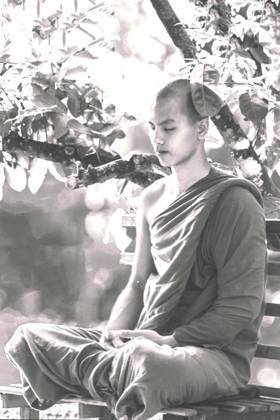


There’s a shadow side to the age we live in. It consists of the ideas that get rejected as unacceptable. Today the shadow is occupied by mysticism. The reason we reject mystical ideas is that they contradict science, technology, rationality, and the five senses. You cannot see or measure where mystical forces come from–they are more hidden than dark matter and energy. It came as a shock when cosmologists discovered that dark matter and energy are not only real, despite being invisible, but they far outweigh the visible universe.
The same is true of mystical forces, or if you prefer, you can call them metaphysical forces. The East has a profound tradition in this area, whereas the West got sidetracked by religion. When God enters the picture, metaphysics gets entangled with faith, dogma, and every kind of warring religious faction. The simple fact that God is unknowable implies that mysticism is unknowable, too.
Eastern tradition is hard to access for modern secular people, and the situation isn’t helped by arcane terminology like karma and dharma. Yet the main mystical ideas embedded in Eastern wisdom traditions aren’t matters of faith. They derive from intimate knowledge of the birthright everyone shares: self-awareness. I often think of the ancient Indian sages as Einsteins of consciousness, because their discoveries are just as momentous as the theory of relativity.
Let me sketch some of the most important mystical ideas, which you will immediately see are contradictory to the modern scientific age.
The first and foremost discovery is this: The field of pure consciousness created the universe. It didn’t do this by creating time, space, matter, and energy. Those are mere appearances. What pure consciousness did was create versions of itself. Everything in the universe is a form of consciousness hiding behind the mask of matter.
All the other mystical ideas spin-off from the main idea.
• Pure consciousness contains every past, present, and future event. Present events are actualized; past and future events are possibilities.
• Being all-encompassing, consciousness is inconceivable. Therefore, as part of creation, human awareness is inconceivable.
• The infinite makes the finite possible.
• If you cling to anything finite as your source, whether mind, matter, tradition, or any belief system, you misunderstand reality.
• Being infinite, reality can be interpreted in any way we choose. The most productive way to interpret it is to accept that reality is human because that is the only perspective our nervous systems are adapted to.
• Just as the physical universe is totally interconnected, so is human reality. No one is an individual. We participate in the collective consciousness, and at a level hard to acknowledge, we participate in collective unconsciousness, where war, violence, prejudice, anxiety, and fear of death reside.
• The saving grace of being human is that we are co-creators of our reality, both collective and personal. Whatever we have done, we can undo.
• Once it emerges into the visible universe, consciousness by its very nature evolves. Creation dominates over destruction. In the setup of human reality, the universe is on our side—we were created to evolve.
• Finally, to realize that anything just stated is true, you must transcend everyday thinking to view your life from a higher level of awareness. Doing this is known in mystical traditions as waking up.
It is easy to see how these discoveries run against the grain of a secular, scientific age that depends upon physical data to validate the truth. The only reason any of these ideas are called mystical is because they run against the grain of collective belief. “Mystical” implies superstition, myth, rejection of the material world as the source of creation, and skepticism about the information delivered by the five senses. Those implications have become part and parcel of the modern worldview, which is quite all right.
Human consciousness is so open-ended that everyone is free to accept the worldview that is most congenial and believable. Sometimes we find ourselves on the cusp, uncertain which worldview to accept. Newton, for example, was the most illustrious and brilliant scientist of his age, but personally, he accepted the Bible as a literal record of the past. Worldviews don’t change because a wrong one is exchanged for the right one. Worldviews change once an accepted one has been thoroughly explored.
In a sense, the reality you accept is like a dark room you are exploring with a flashlight. The room is vast and cluttered with innumerable things to ponder, explore, discover, and be curious about. But no room is infinite, and eventually, you and I and everyone who has ever lived shines the flashlight on a door that leads to the next room.
The process begins all over again with a new worldview.
Mystical ideas, insofar as they belong to an old room that humankind has left behind, won’t be repeated in ways already familiar to both East and West. They will assume a new guise to fit the current stage of evolution by which I mean not physical evolution but the evolution of consciousness. Countless people find themselves, like Newton, on the cusp. With religion on the wane, science has been triumphant in the modern secular world.
But science owes its success in large part to ignoring the subjective world “in here” in order to explore materialism “out there.” You can’t ignore half of reality, no matter how triumphant technology has become. “In here” has a claim on all of us, all the time. In an unpredictable way, the ideas that are rejected, even ridiculed, by labeling them as mystical (i.e., foolishly superstitious) will morph into versions of reality that will grip our imagination. We will shine our flashlight on the next door, the one that leads to a new stage of human evolution.
DEEPAK CHOPRA MD, FACP, FRCP, founder of The Chopra Foundation, a non-profit entity for research on well-being and humanitarianism, and Chopra Global, a whole health company at the intersection of science and spirituality, is a world-renowned pioneer in integrative medicine and personal transformation. Chopra is a Clinical Professor of Family Medicine and Public Health at the University of California, San Diego, and serves as a senior scientist with Gallup Organization. He is the author of over 90 books translated into over forty-three languages, including numerous New York Times bestsellers. Chopra has been at the forefront of the meditation revolution for the last thirty years. He is the author of the forthcoming book, Digital Dharma: How to Use AI to Raise Your Spiritual Intelligence and Personal Well-Being. TIME magazine has described Dr. Chopra as “one of the top 100 heroes and icons of the century.” www.deepakchopra.com
#MysticalIdeas
#Consciousness
#EasternWisdom
#Spiritual #Evolution
#DeepakChopra